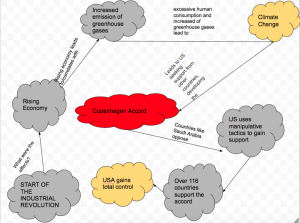2. My diagram follows how systematic the entire outcome of climate change is. It starts at the beginning, which follows the module, introducing the industrial revolution, which then increased human consumption. The rise of human consumption paired with the increased emission of greenhouse gases shows the direct correlation between human activity and global climate change. Furthermore, my diagram then shows how following the idea of climate change, the United States still put greed above all and constructs a treaty which will manipulate and essentially discredit other countries who do not follow the Copenhagen Accord. My diagram also displays how some countries were not on board with the Copenhagen Accord, and how they were subjected to manipulation as well, thus creating overwhelming support of this act. Countries like Saudi Arabia are huge in the oil industry, and they are a huge competitor for us, which made it extremely important to get them on our side. We used various angles to give us leverage. After the United States became successful in convincing the necessary countries, we see now that most other countries that aren’t involved almost have no choice but to jump on board as well at this point. Now, we have over 116 countries who support, and a lot more who are planning to actively support the accord as well. This ultimately ends with the US being in control, just as they wanted. The United States’ main goal was to anchor global trade, and we now can continue to off shore oil drill and explore more drilling sights in other countries, thus increasing greenhouse gas emissions, worsening climate change.
3. When thinking critically about climate change, I would say that ethics heavily influence why we do the things that we do. From Module 3, we learned about distributive justice, showing that we think about the consequences after they happen, and we focus on what benefits one half, and disadvantages the other. I feel the same way about global climate change. Making this a global scale, the United States is in control, and we continue to warm the troposphere. I will not place all blame on the United States, but I will put the majority of the causes on our country since we are in total control now. We as Americans are collectively individualistic, and we tend to do things for gain. I personally am happy that information like Wikileaks is available to me. When thinking about the total population, I can’t say that I disagree with others having the information readily available to them as well. I think in order to close the information gap, we need to spread information like this. I think we have a right to know what is happening in the world, despite the corrupt nature of most actions put in place. I do not think that the United States should be going about the Copenhagen Accord this way, but at the end of the day, we want money and control over everything. At this point, I feel like way too many hands are in the cookie jar, and just like our module states, we would essentially be redirecting tons of money into other things, which will disrupt the majority of the economic circulation and change lifestyles totally and indefinitely.


Dear Shanda
Hello my name is Justin, and I really enjoyed your post. In my post I described how the U.S. was shown through the WikiLeaks to use threats and coercion to persuade small countries to side with them on the Copenhagen Accord. It was interesting that we had similar interpretations of the article. I was intrigued how you incorporated the different layers of Justice with climate change. I haven’t thought of climate change that much in those terms. very informative.
Check out my post: http://sites.psu.edu/geog30/2016/04/06/53232/
Hello! I like how you designed your diagram and I completely agree with your statement in your second paragraph. This whole situation ultimately comes down to ethics. The US handled the Copenhagen Accord in an unethical way, but since we are such a huge diplomatic influence, we can get away with it.
You can read my post here:
http://geog030.dutton.psu.edu/2016/04/06/climate-change-katie-cuerou/
Hi Shanda, this is Akiksha, currently a freshman here at University Park. I liked how you’ve linked this issue to the start of industrial revolution and completely agree that it is us humans, who just look for our profit and increase in productivity which has led to this climate change being such an important issue. The mention of how it was important to get Saudi Arabia agree is also very informative and important and explains why US used unfair means to get allies, as these allies were important for support. Regarding your views, I completely agree with them and have talked about distributive justice in my post as well. However, in my post I have mentioned that the Accord did lead to some decrease in climate change.
Here is a link to my post :
http://sites.psu.edu/geog30/2016/04/06/copenhagen-accord-boon-or-bane/
I hope you get time to go through it too.